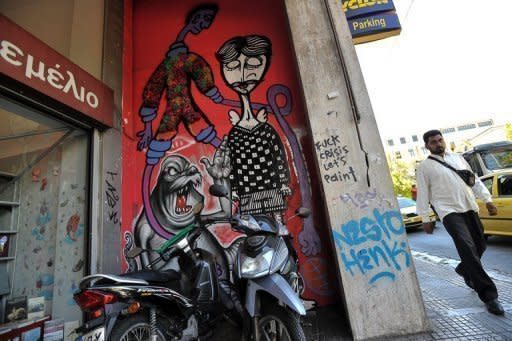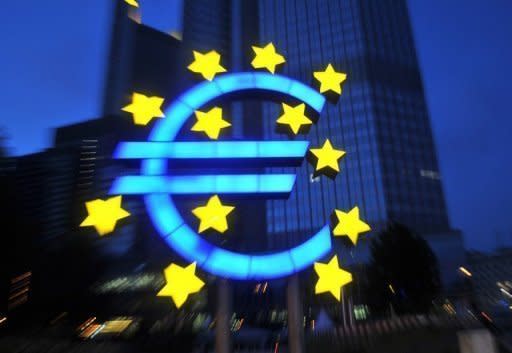Eurozone big four vow billions to boost growth
The leaders of the eurozone's four biggest economies on Friday vowed measures worth up to 130 billion euros ($163 billion) to tackle the bloc's relentless debt crisis. Meeting for talks in Rome ahead of a crucial EU summit in Brussels next week, the leaders of Germany, France, Italy and Spain looked to soothe global worries with promises to kickstart growth in the bloc's floundering economies. French President Francois Hollande said the leaders had agreed to mobilise "one percent of European GDP, that is 120 to 130 billion euros, to support growth" -- a move Germany's Angela Merkel hailed as "an important signal". Italian Prime Minister Mario Monti said the four leaders had agreed that boosting growth in the eurozone was key to restoring confidence. "The first objective we agree on is to relaunch growth, investments and to create jobs," Monti said at a press conference after the talks. "The euro is here to stay and we all mean it," he added calling the single currency "irreversible." Hollande last week proposed a 120 billion euro "growth pact" to tackle the debt crisis, though much of the money comes from already existing programmes. The measures would include a capital injection for the European Investment Bank, the redirection of some unspent EU regional funds and "project bonds" to finance infrastructure works. But Merkel, who has led the drive for eurozone austerity, said more moves for financial and political integration were necessary to overcome the debt crisis in the long term. "The lesson of this crisis is more Europe, not less Europe," she said. "We need to work closer together politically, especially in the eurozone. Whoever has a common currency must also have coherent policies. That is also a lesson from the last two years." Hollande hit back with a veiled call for Germany to accept a greater share of the eurozone's overall financial burden, saying there could be "no transfer of sovereignty without greater solidarity". He added that "wanting growth precisely makes sure that budgetary rigour does not become austerity. I am against austerity." France has been pressing Germany to accept the idea of eurobonds -- mutualising the bloc's sovereign debt -- but Berlin has fiercely resisted. Merkel made no mention of the idea on Friday, but Hollande continued to push. "I believe eurobonds must be a prospect, and not in 10 years.... Eurobonds would be a useful tool for Europe, I will continue working in this direction," he said. With the two-year-old crisis threatening to engulf Spain and Italy and weighing down the global economy, Europe's leaders are under intense pressure to find solutions. Monti had raised the stakes ahead of the talks, warning that failure to reach a deal at the EU summit would leave the bloc vulnerable to attack by financial market speculators. "There would be progressively greater speculative attacks on individual countries, with harassment of the weaker countries," he said in an interview with European newspapers including Britain's Guardian and Italy's La Stampa. Both Madrid and Rome have been hit by rocketing borrowing costs, despite a series of structural reform packages in Italy and a eurozone rescue loan in the works for Spain's stricken banks. Spanish Finance Minister Luis De Guindos said on Friday the country would formally request eurozone aid for its banks on Monday, after Madrid said they need up to 62 billion euros ($78 billion) to survive a severe financial slump. "We will submit next Monday the letter with the formal request for aid," he said after two days of talks with European counterparts in Luxembourg. Ahead of next week's EU summit, the four leaders also discussed broader efforts towards closer political integration, and the banking or financial union that economists see as essential to getting to the root of the debt crisis. The United States, the International Monetary Fund and the European Central Bank have all urged greater banking integration in Europe, as the debt crisis bounces back and forth between the private financial sector and national treasuries. "The euro area crisis has reached a critical stage," the IMF said on Thursday. "Despite extraordinary policy actions, bank and sovereign markets in many parts of the euro area remain under acute stress, raising questions about the viability of the monetary union itself." Adding to the sense of urgency, the ratings agency Moody's downgraded on Thursday the credit ratings of 15 of the world's biggest banks, citing exposure risk and Europe's economic woes. But the markets responded in muted fashion with dealers saying that bank share prcies had already priced in the widely expected downgrade. At close in Europe, shares had only dropped slightly and Wall street showed solid gains in late afternoon trade. An EU finance ministers meeting in Luxembourg buried a bid to impose an EU-wide financial transactions tax, but Merkel said the four leaders at the Rome talks come out in favour of the levy. "The people in our countries have the impression that the crisis started in the financial markets and that they have not contributed enough to the solution," she said.





